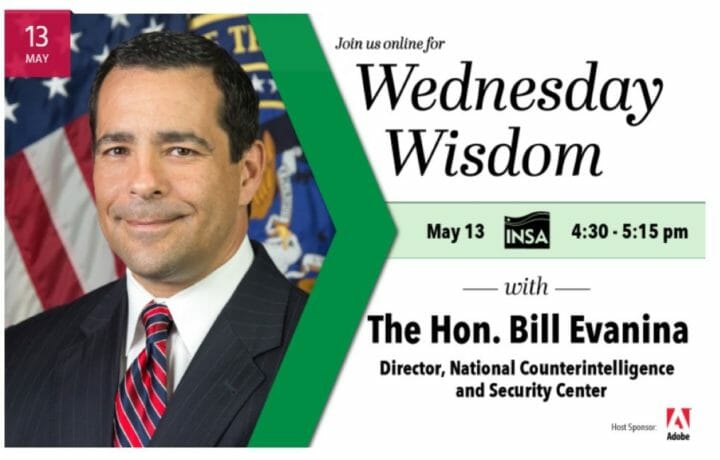For this week’s Wednesday Wisdom with the Intelligence and National Security Alliance (INSA) we heard from the Honorable Bill Evanina, Director, National Counterintelligence and Security Center (NCSC).
Evanina emphasized that the private sector is never more important than it is now – but for every crisis there is opportunity for positive change. We have to work as one nation in fighting our adversaries to overcome today’s challenges.
COVID CYBER THREATS
Evanina’s counterintelligence strategy through COVID-19 is to help us solidify supply chain mitigative measures. The Federal Bureau of Investigation (FBI) and the Cybersecurity and Infrastructure Security Agency (CISA) have warned that other countries are intent on obtaining U.S. classified research related to the coronavirus. “As we prioritize threats, COVID-19 is at the top of the list,” he says. “Research & Development protection is of the utmost importance.”
U.S. universities are also targets of Chinese security services, so NCSC is trying to spread threat awareness to these entities. The healthcare sector has been a horrific target through the pandemic, and those institutions may not be as well protected as organizations are in the DoD. While a lot of the cyber threats can be attributed to China, NCSC has also seen similar threats from smaller actors. While Evanina doesn’t believe Iran has the capability to create a vaccine, regimes could still be planning retaliations for recent attacks, such as Operation Martyr Soleimani.
TRUSTED WORKFORCE
Evanina said now may be the time to look at what Trusted Workforce 3.0, 4.0 or 5.0 may look like. The DoD is seeing velocity rates of new clearances issued – a 60-70% increase from where we were a year ago. While things are running business as usual, the security clearance process and reform needs to be looked at with the future in mind.
Evanina also touched on the difference between Continuous Monitoring (or Continuous Vetting) and Continuous Evaluation (CE). While Continuous Monitoring is agency specific and done on their own direct employees, CE happens regardless of where you are working. While COVID-19 prevents agencies from conducting full continuous monitoring because they are no longer able to do behavior analysis/keystroke monitoring on computers with people at home, they are working on that issue as people transition (or eventually will transition) back to working onsite in classified environments.
PARTNERING WITH INDUSTRY
NCSC has partnered and worked closely with directors at U.S. Research Universities to ensure that the IC is providing actionable intelligence to the critical medical and vaccine research they’re doing. These entities, like other private sector contributors, are critical to national security.
Evanina wants to “make sure we partner effectively between government and the private sector. Maybe reduce regulatory manners and mechanisms so infrastructure can help to defend the private sector and the nation as a whole.” He calls on industry to be the lead in creating solutions that are germane to government solutions, which will protect nongovernmental entities. “Industry are experts – you have great ideas that should come to the forefront. The government is thirsty for private sector innovation.”
The first thing Evanina will do after ‘social distancing’ comes to a close,is host a half day with his team getting to know each other again. Humans need interaction and individuals who work together generally play together. Ensuring his team integrates their lessons learned and get back to a somewhat normal routine, they will return to the core business of humans working together. “We will get more efficient products this way.”

